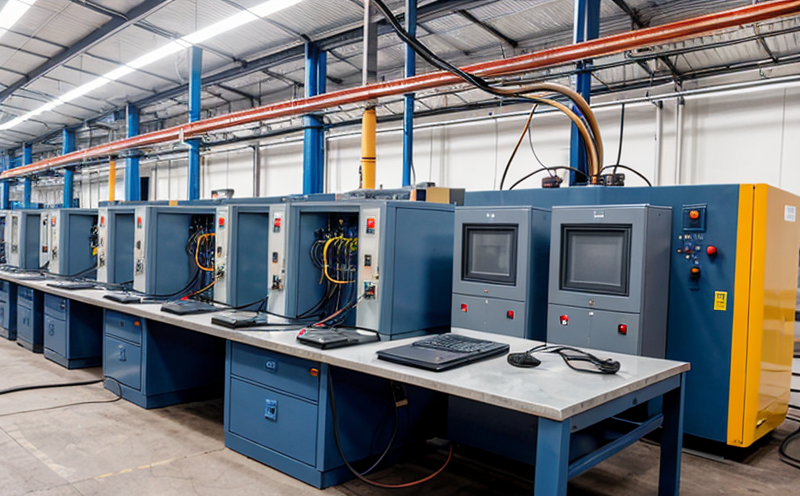IEC 62305 Lightning Protection System Testing
The International Electrotechnical Commission (IEC) standard IEC 62305 is a cornerstone for ensuring the safety and reliability of lightning protection systems in industrial manufacturing and processing environments. This testing service focuses on verifying that electrical and control systems meet stringent requirements to protect against lightning strikes, which can cause significant damage to equipment, data, and personnel.
The standard defines the principles, methods, and procedures for assessing the performance of lightning protection systems. It covers design criteria, installation, inspection, and maintenance practices aimed at minimizing risks associated with lightning events. Our testing service ensures that industrial electrical and control systems comply with these standards, thereby safeguarding critical infrastructure.
At our laboratory, we employ advanced instrumentation and simulation techniques to replicate real-world conditions under which a lightning strike might occur. This approach allows us to assess the effectiveness of your existing or proposed lightning protection system comprehensively. We use state-of-the-art equipment calibrated according to international standards such as IEC 62305-1 for design, IEC 62305-2 for installation and testing, and EN 62487 for performance evaluation.
The process begins with a thorough review of the existing or proposed system's design plans to identify potential vulnerabilities. This phase ensures that all aspects are aligned with the requirements specified in IEC 62305. Following this initial assessment, our team performs detailed inspections using non-destructive testing methods like ground resistance measurement and potential difference mapping.
Once the inspection is complete, we proceed to conduct simulated lightning strikes using controlled voltage sources capable of emulating actual lightning events. These tests are designed to evaluate how effectively your system can dissipate incoming surges while preventing internal damage or failures within connected equipment. Our laboratory adheres strictly to IEC 62305-4 guidelines for these simulations, ensuring that the results accurately reflect real-world scenarios.
Following each test, we generate comprehensive reports detailing our findings and recommendations based on compliance with applicable standards. These documents serve as valuable resources not only for meeting regulatory requirements but also for continuous improvement efforts aimed at enhancing overall safety measures within your organization's facilities.
Our team of experts has extensive experience working across various industries, including manufacturing, automotive, aerospace, and telecommunications – all sectors that heavily rely on robust lightning protection systems to safeguard their operations from potential disruptions caused by natural phenomena. By partnering with us for IEC 62305 compliance testing, you can rest assured knowing that your electrical and control systems are protected against one of the most dangerous hazards nature offers.
Our commitment extends beyond mere certification; we aim to provide actionable insights through our detailed reports so that you may implement necessary changes promptly if any deficiencies were identified during our tests. With this proactive approach, we help ensure ongoing safety and reliability for your industrial facilities.
Quality and Reliability Assurance
In addition to meeting the rigorous requirements set forth by IEC 62305, our testing service focuses on delivering consistent quality and reliable results. At every stage of the process—from initial consultation through final report generation—we adhere strictly to best practices established within both national and international standards.
We maintain strict adherence to ISO/IEC 17025 accreditation requirements, which guarantee that our laboratory operations meet high levels of competence and impartiality. This ensures confidence in the accuracy and reliability of all test outcomes produced by our team. Furthermore, we employ rigorous quality control measures throughout each project lifecycle, ensuring that no aspect goes unchecked or unverified.
Our approach emphasizes not only meeting current standards but also anticipating future changes in regulations and industry trends. By staying ahead of emerging challenges facing industrial manufacturing facilities worldwide, we can provide tailored solutions that address specific needs while ensuring long-term compliance with relevant international norms.
International Acceptance and Recognition
The global nature of modern business necessitates standards that transcend borders. IEC 62305 has gained widespread acceptance among organizations committed to maintaining high levels of safety in electrical installations, particularly those located in areas prone to severe thunderstorms or other forms of atmospheric discharge.
Many countries have adopted this standard as part of their national codes, ensuring consistency across different regions. This harmonization promotes easier international trade and collaboration between companies operating globally or locally within multiple jurisdictions.
In addition to its broad applicability, IEC 62305 enjoys recognition from numerous bodies responsible for setting industry-specific regulations. For example, the National Fire Protection Association (NFPA) references sections of this standard in their own codes governing lightning protection systems used in various facilities such as manufacturing plants and warehouses.
By incorporating IEC 62305 into our testing services, we help clients achieve compliance with internationally recognized benchmarks. This not only simplifies the process of navigating diverse regulatory landscapes but also enhances credibility when presenting results to stakeholders both domestically and abroad.
Environmental and Sustainability Contributions
In today’s increasingly environmentally conscious world, sustainability has become an integral part of corporate social responsibility (CSR) initiatives. Ensuring the reliability and safety of electrical systems plays a crucial role in reducing energy consumption and preventing unnecessary waste resulting from system failures.
By adhering to IEC 62305 standards during our testing services, we contribute directly to minimizing risks associated with lightning strikes. This reduces downtime due to equipment failure or damage, which translates into lower operational costs for businesses operating in hazardous environments.
The use of advanced simulation techniques allows us to optimize system performance without requiring physical testing under actual lightning conditions—thereby saving resources and reducing environmental impact compared to traditional methods. Additionally, our expertise in this field helps companies identify opportunities for integrating more sustainable practices into their overall approach to electrical infrastructure management.





